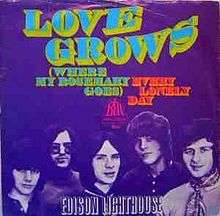Love Grows (Where My Rosemary Goes)
| "Love Grows (Where My Rosemary Goes)" | ||||
|---|---|---|---|---|
 | ||||
| Single by Edison Lighthouse | ||||
| B-side | "Every Lonely Day" | |||
| Released |
January 1970 (UK) 21 February 1970 (US) | |||
| Recorded | England, November 1969 | |||
| Genre | Pop rock | |||
| Length | 2:51 | |||
| Label | Bell Records | |||
| Writer(s) | Tony Macaulay / Barry Mason and Sylvan Whittingham | |||
| Producer(s) | Tony Macaulay | |||
| Certification | Gold (RIAA) | |||
| Edison Lighthouse singles chronology | ||||
| ||||
"Love Grows (Where My Rosemary Goes)" is a popular song by "one-hit wonder" Edison Lighthouse. The single hit the number one spot on the UK Singles Chart on the week ending on 31 January 1970, where it remained for a total of five weeks.[1] It also became the first number one single of the 1970s (not counting Rolf Harris' "Two Little Boys" which was a holdover from 1969).
Song profile
"Love Grows (Where My Rosemary Goes)" was written by Tony Macaulay, Barry Mason and Sylvan Whittingham. Essentially, they were a studio group with prolific session singer Tony Burrows providing the vocals. When the song became a hit, a group needed to be assembled rapidly to feature the song on Top of the Pops, a popular TV show. Sylvan Whittingham found a group called 'Greenfields' and brought them to Tony's auditions a week before their appearance on Top of the Pops. Once chosen and rehearsed, they appeared on the show as 'Edison Lighthouse' to mime to the fastest climbing number 1 hit record in history. Burrows sang the song on the programme during his third appearance on the same show with three different groups.
"Love Grows" reached number 5 on US pop chart, number 3 in Canada, and number 1 on the UK Singles Chart for five weeks in January and February 1970. It reached number 3 in South Africa in February 1970.[2]
In an interview in 2003, Rob Grill of The Grass Roots said that the song had been offered to them, but they turned it down.
Chart performance
Weekly charts
|
Year-end charts
|
Cover versions
- Jerry Vale covered the song on his 1970 album Let It Be.
- Anni-Frid Lyngstad covered the song in 1970 as "Där du går lämnar kärleken spår" (Where you go, love leaves traces).[13]
- Uschi Glas covered the song in 1970 in German as "Wenn dein Herz brennt".
- In 1984, Hong Kong singer Samuel Hui covered the song in Cantonese as "Tsui Hei Foon Lei" (最喜歡你, which means "like you the most").
- British indie pop band The Siddeleys covered the song on the 1990 compilation Alvin Lives (In Leeds) - Anti Poll Tax Trax.
- In 1995, Swedish dansband "Distance" (later "Frida & dansbandet") covered the song with lyrics in the Swedish language, as "När du ler" ("When you smile").[13]
- In 2002, the Not Lame Recordings CD Right to Chews—a collection of modern bands performing cover versions of bubblegum pop songs—included Beagle's version of the song.
- In 2007, Little Man Tate did a cover of this song at their concerts at the Boardwalk, Sheffield and at the Bolton Soundhouse.
- Freedy Johnston covered the song on his 2001 album Right Between the Promises.
- Les Fradkin covered the song on his 2004 album Perfect World.
- In 2012 Dennis Diken with Bell Sound recorded a version for a fundraising album titled Super Hits of the Seventies for radio station WFMU.
In the media
- The song is featured in the closing scenes of the film Shallow Hal (in which the female lead played by Gwyneth Paltrow is named Rosemary).
- It serves as the musical theme of the film Little Manhattan (wherein the female love interest is also named Rosemary), performed by Freedy Johnston.
- It was featured in a fifth season episode of The Sopranos ("All Happy Families...") during a hit on a friend of Little Carmine Lupertazzi.
- It is referred to in the narration of Reservoir Dogs, as part of the fictional "K-BILLY's Super Sounds of the '70s" radio show, but the song itself is not played.
- It is parodied in the game Al Emmo and the Lost Dutchman's Mine, at the title theme for Act 3: Shallow Al.
- It acts as the closing theme to The Kennedys.
References
- ↑ Roberts, David (2006). British Hit Singles & Albums (19th ed.). London: Guinness World Records Limited. pp. 241–2. ISBN 1-904994-10-5.
- ↑ Brian Currin (2003-05-25). "South African Rock Lists Website - SA Charts 1969 - 1989 Acts (P)". Rock.co.za. Retrieved 2014-03-27.
- ↑ "Item Display - RPM - Library and Archives Canada". Collectionscanada.gc.ca. Retrieved 2016-03-09.
- ↑ "flavour of new zealand - search listener". Flavourofnz.co.nz. Retrieved 2016-10-03.
- ↑ "Music lyrics, charts, Games, & more". Top40db.net. Retrieved 2016-03-09.
- ↑ "CASH BOX Top 100 Singles". Archived from the original on March 19, 2013. Retrieved April 26, 2015.
- ↑ Steffen Hung. "Forum - 1970 (ARIA Charts: Special Occasion Charts)". australian-charts.com. Retrieved 2016-03-09.
- ↑ "Go-Set Australian charts - Top Records for the Year of 1970". Poparchives.com.au. Retrieved 2016-03-09.
- ↑ "Item Display - RPM - Library and Archives Canada". Collectionscanada.gc.ca. Retrieved 2016-03-09.
- ↑ "Top 100 1970 - UK Music Charts". Uk-charts.top-source.info. Retrieved 2016-03-09.
- ↑ "Top 100 Hits of 1970/Top 100 Songs of 1970". Musicoutfitters.com. Retrieved 2016-03-09.
- ↑ "Cash Box YE Pop Singles - 1970". 50.6.195.142. 1970-12-26. Retrieved 2016-03-09.
- 1 2 "Där du går lämnar kärleken spår | Svensk mediedatabas". SMDB. Retrieved 2014-03-27.
| Preceded by "Two Little Boys" by Rolf Harris |
UK Singles Chart number-one single January 31, 1970 (5 weeks) |
Succeeded by "Wand'rin' Star" by Lee Marvin |